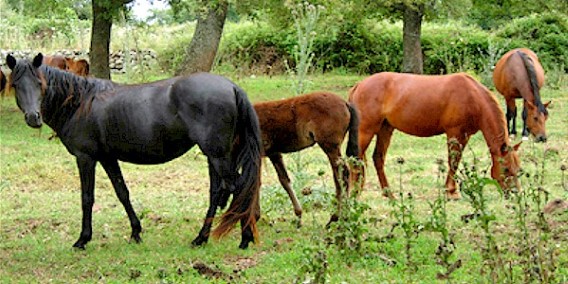Sarcidano Horses ( orCavallo del Sarcidano) are a rare breed
of semi-feral horse originating from the Altopiano del Sarcidano ("plateau
of Sarcidano") in the commune of Laconi in the Oristano province of
Sardinia, Italy. They are one of the fifteen indigenous horse "breeds of
limited distribution" recognized by the AIA, the Italian breeders'
association. Although they should never exceed 148 cm (14.2 hands) at the
withers, they are officially considered a cavallo or horse, and not a pony.
No use of the Sarcidano horse is documented. In 2001 the
possibility of starting a few horses for use in trekking were considered.
Sarcidano horses appear to have ancient Spanish ancestry in
common with the Andalusian horse. Studies by Valiati (1997) and by Bell (1999)
of transferrins are reported to confirm common ancestry with the Iberian horse
of 25000 years ago. A 1996 study of protease inhibitor polymorphism concludes
that "a genetic correlation could be present between Sarcidano Horses and
ancient Spanish horses as reported by historical documents about horse breeding
in Sardinia". The "constant" presence of the seventh molar in
the upper jaw is cited as evidence of ancient origin by Baccino, who notes that
this characteristic is shared by only a few ancient breeds such as the Exmoor
Pony and the Caspian horse; Baccino also notes the presence in the Sarcidano
horse of an allele otherwise seen only in Przewalski's Horse.
In 1999 a group of 15 Sarcidano horses was acquired by the
comune of Laconi from a private owner; this herd lives in the state-owned
forest of Funtanamela, on the Sarcidano plateau, and in 2006 numbered approximately
100 horses. A second herd, privately owned, also lives in the same area, while
a third group is held by the Istituto di Incremento Ippico della Sardegna
(Sardinian horse-breeding institution) of Ozieri, at Foresta Burgos in central
northern Sardinia. In 2007, the total Sarcidano horse population was
approximately 190, of which 78 were mares.
The Sarcidano horse was recognised as a breed by Ministerial
Decree No. 24347, dated 5 November 2003; the breed register was established in
2005, and is held by the Associazione Provinciale Allevatori (regional
breeders' association) of Nuoro.
According to the breed standard, a Sarcidano Horse may be
black, bay, or grey; other coat colours are excluded from registration. The
height range for males is 125–145 cm (12.1–14.1 hands), the girth 140–160 cm
(55–63 in) and the cannon circumference 14–17 cm (5.5–6.7 in); for females the
height measures 115–135 cm (11.1–13.1 hands), the girth 120–150 cm (47–59 in)
and the cannon 13–16 cm (5.1–6.3 in). Horses over 148 cm (14.2 hands) at 30
months may not be registered.
Their head is rather heavy and roughly set on, their profile
is straight, their ears are mobile and their eyes and nostrils large. Their
neck is muscular and their mane is thick. Their shoulders are fairly straight,
their withers high and their croup is short but muscular. Their legs are short,
strong and reasonably well conformed, their joints are broad, and their hooves
are strong but tend to be cylindrical. Their action is lively and sure-footed.
Sarcidano Horses have a lively and responsive nature, and
adapts well to equestrian uses. They are frugal and resistant.
